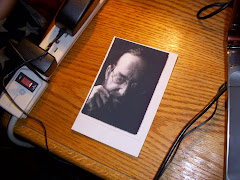Cuento 4: “Don Visions and La Doña” (870 words)
Let us sip some café. Por favor, my guests, siéntense, here on my veranda, out of the southwest vienta. See how elegantly Marta has set our table—Gracias, Martita!--complete with peace lilies in mi abuela’s cobalt-glass vaso on the hand-crafted mesa? Rosquillas beckon on my great-aunt’s hand-painted, gold-trimmed Limoges plate, thin as eggshell, translucent. And cups extraordinaire, anywhere, crystal I rescued in a coup de garage sale in Glenwood—6 Waterford cups, signed, mint condition!--from an Oxydol box of dirty rags I bothered to finger, then bought pronto for $1.
Would you pour, La Doña?
These were carried just for café at palomas, querida, wrapped in pop’em plastic in my ancient, reinforced Samsonite suitcase, still going strong. I never carry it myself when I can help it, but it’s indispensible for toting my desktop publishing empire and one or two fine, appropriate objets to embellish “Tierra Mia” lifestyle. It’s not “Rich-and-Famous,” yet, but we’re above-the-poverty-line-elegante in very small things. Next trip down, Samson will hold some Wewer Keohanes from my Glenwood collection, in gilded frames, for my new cuartos, north of my current room, and a pewter duck.
This Old-Zorro-don sets a courtly table when it counts, a glittering Wow for everyone breathing inTeote, out here in the drying cornstalks. Fresh-toasted café for dipping chewy rosquillas counts for everything, as lifted-pinky as possession-poor campesinas can make it, serving hospitality with finesse.
Ah, sí, I grow this café myself, here on “Tierra Mia,” under those spreading banana trees down south there.
I’ve rented that pasture to the east, below those sexy montañas, to grow corn, provide work projects and food for my older hijos, keep them out of tabaco. The don in me deeply covets it. It looks great from mi ventana, full of well-fed maís. I can watch it grow a half a foot daily in the rainy season, without leaving mi oficina. The owner, here pouring, mi amiga La Doña, won’t sell--Naughty Señora!--though I’ve asked many times: it was her dear don Gumercindo’s favorite piece of land.
Somehow, though, the way mi loca vida twists and turns, I intuit I’ll own it, someday, with the help of the Arcángel. La Doña to Teote, Estebana Sanchez is 97, a good friend. She has, from me, a framed photocopy of the Arcángel in all his glory, on her sala wall. We dance sometimes, at fiestas, very, very slowly. I’m delicate, after all, un viejito. She’s a tough, wizened crone, in the best sense, es cierto. And, too, while I want her “memory-lane” mostly to keep it unobstructed along the track to the río Limon, as well for caballos and sweet corn, a few coco palms to bisect the view from palomas, I’m not really very greedy, for an aristocrat.
Prime campo land of two acres, though, that pasture with its own artesian seep, good clay for tiles--Ay, Chihuahua, amigos! Unfortunately, even if La Doña deigned to sell, it’s jumping out of reach, though only twenty feet from my property line, straight across the road. Van Gogh would have lost his other ear to this mystical view out my writing window.
The foundations of La Doña’s first casa as a married woman are located there. The house melted in the rains, after her husband took the tin roof, during the war, to use as ceiling for a bomb shelter at her city home, back in 1980. What didn’t melt was blasted to smithereens in 1981, as the Contras moved con fuerza to take Teote from the Sandinistas, who considered the battle to keep the town a fight to the death. Many got buried. The old shooting trench from La Guerra, around the town’s perimeter then, still crosses the pasture, north to south, though it’s a bit crumbled in. Cottontails make it home.
I’d love to have her in the neighborhood, again, now I’m a local don. She’d tart up el vicino even faster, and be closer, as well, for our visitas than up in Arriba, where the oldest families live, some in compounds with an ancient stucco wing like hers, stout wooden beams still arching the sala, under a roof of tile. Her husband, don Gumercindo Sanchez, and she founded a most vibrant and peso-savvy family in Teote: their hijos have carried on the Sanchez tradition of moving and shaking most pragmatically with the times.
According to La Doña, half the ricos in Jalapa have knocked at her door, ruining her siesta and her estomago, but offering mountains of dolares for her former home site in Teote, to develop as a projecto of 48 teeming casitas or to grow tabaco: “Ay, no!” she says; she doesn’t like that picture any more than I do. The price is rising even faster than the market, though, and too big a chunk for me: I haven’t got much money left this trip, on purpose. I live on a very fixed income, here and there, and need to get used to it. Ah, well, even though my writing desk faces the campo, with those hills, naked majas Tropicanas on parrot-green lounges, if I’m meant to have it, I will, even in Pension-City, Nicaragua.
Monday, March 17, 2008
Subscribe to:
Post Comments (Atom)
















































































No comments:
Post a Comment